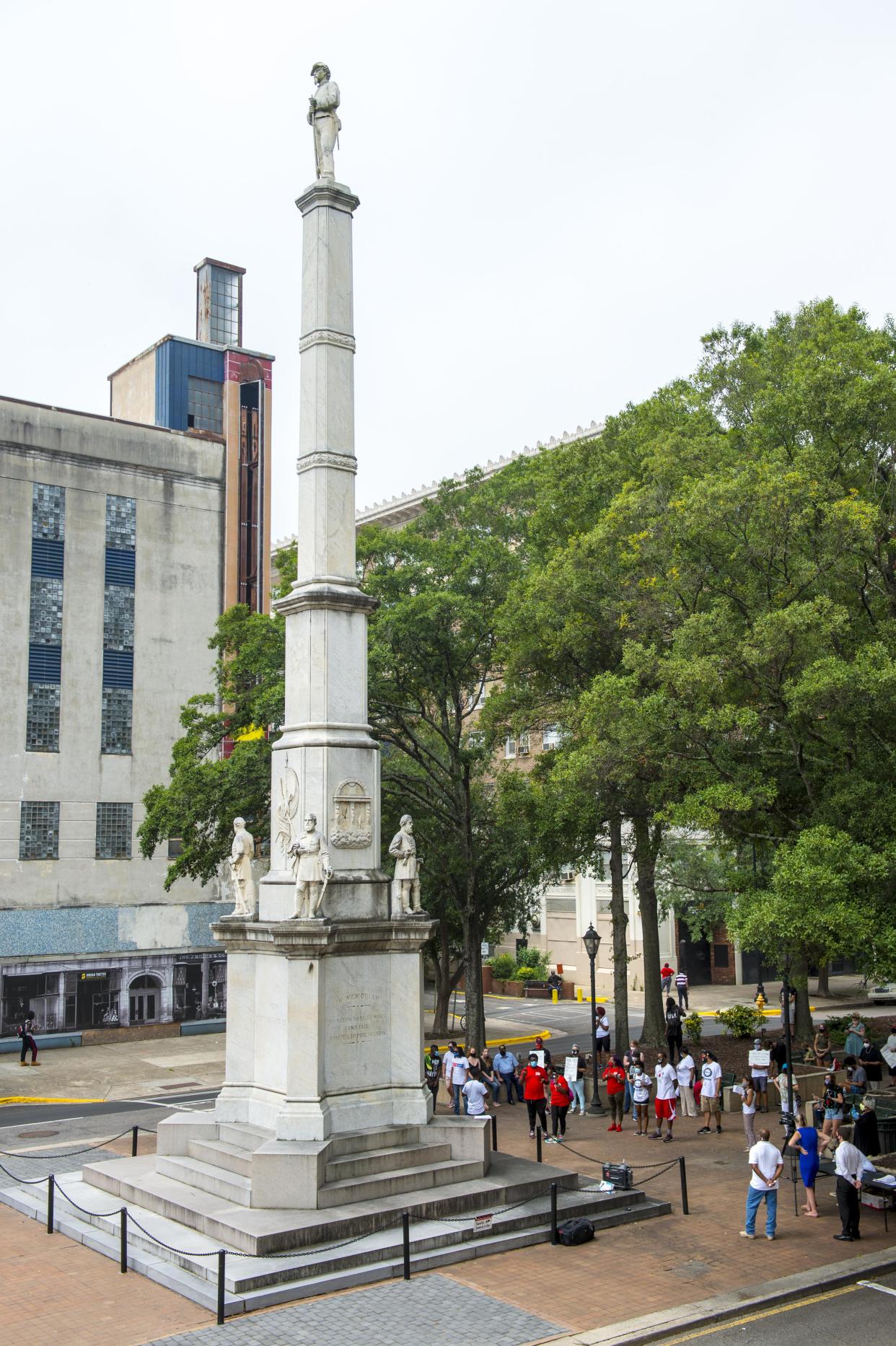Opponents tell Augusta Commission it's time for a decision on Confederate monument

The Augusta Commission’s self-imposed pause on talking about the removal of Confederate monuments and names from city property is set to expire. Two advocates revisited the subject Tuesday and told city leaders they aren't letting the matter drop.
Last September, the commission voted unanimously to table all discussion of recommendations made by the Mayor's Task Force on Confederate Monuments, Street Names and Landmarks. The group recommended the city move or remove the Confederate statues and street names from city property.
Mayor Hardie Davis, who offered no response Tuesday, created the task force in August 2020, citing the May death of George Floyd at the knee of a Minneapolis police officer and other acts of racism and police brutality. Since then a handful of cities and counties have removed them, and the Army is in the process of removing the names of Confederate generals from military installations, including Fort Gordon in Augusta.
Commissioner Ben Hasan said at the time any decision needed to wait until the launch of a massive streetscape project in downtown Augusta, which includes Broad Street. Augusta’s largest Confederate memorial – a 76-foot marble obelisk – stands in the median of the 700 block of Broad.
Removing monuments and renaming streets have not been included in plans for the $30 million-plus project, and the city currently has one part of the project – upgrades of Fifth and Sixth streets – out for bids. State law governing the Transportation Investment Act sales tax-funded projects require all downtown streetscape projects be initiated by the end of 2022.
Read More: Moving Augusta's Confederate monuments discussion tabled until June
Read the report: Augusta task force recommends removing Confederate monuments, names
Michael Gallucci, a retired Army command sergeant major who has asked the city to formally redress racial inequalities, and Paine College historian Mallory Millender, who served on the task force, revived the debate Tuesday.
Gallucci asked the commission to hold a referendum on the decision. “Make it a binding question on the November ballot," he said.
The monuments honor slavery and the belief that Black Americans are inferior and should be removed, Gallucci said. He dismissed the response that removing them will subject the city to lawsuits.
"You’re told you can’t remove them and yet there’s been no successful lawsuit supporting that premise," he told commissioners.
A state law bans moving publicly-owned monuments anywhere lacking “similar prominence, honor, and visibility,” but it hasn't stopped a handful of Georgia local governments, including the cities of Athens, Decatur, Conyers and Cordele from moving or dismantling the monuments. The Georgia Supreme Court has not overturned an appeal holding the Sons of Confederate Veterans organization lacks standing to sue two Georgia counties that remove them.
Gallucci said the city’s response to an open records request shows the Broad Street monument, while situated on public property, is unlikely subject to the state law. The response stated Augusta possesses no document indicating it holds title to the monument.
“No records exist showing city or county ownership, making it privately-owned, not public and arguably then not subject to Georgia law,” Gallucci said.
Moving the monument is “no more an act of erasing history than removing ‘whites-only’ signs,” he said. The proliferation of monuments such as the one erected on Broad in 1877 by the Ladies Memorial Association of Augusta was “erasing the true story of the effect of slavery,” he said. “They were the fake news of their time.”
No one from the Sons or another group appeared Tuesday in opposition to the requests. Ahead of the 2021 lawsuit against Gwinnett County, a release stated their members sought "to vindicate the law of the State of Georgia and to defend their ancestors’ names."
More: Confederate heritage remains engraved on Fifth Street bridge
More: Fort Gordon should be renamed Fort Eisenhower, commission says
Millender said the decision to move the monuments shouldn’t be difficult.
“Relocating Confederate monuments from public spaces should be neither difficult nor divisive,” he said.
Millender reminded the commission that one of the task force’s recommendations was to erect monuments honoring leaders who fought division, such as George Williams Walker, the second president of Paine College and a Confederate veteran, and John Wesley Gilbert, Paine's first graduate and first Black professor.
Walker instituted a policy where all faculty, staff and students addressed one another as mister, mrs. or miss and insisted Paine maintain a liberal arts curriculum, rather than the industrial training programs being formed at the time, Millender said.
In a 1908 speech, Walker said "the establishment and development of Paine college was the first great step in interracial cooperation in our beloved southland," he said.
"We urge you to remove the monuments that glorify man’s inhumanity to man and in their stead, erect monuments to people including Dr. Walker who devoted their lives to human uplift and racial harmony," Millender said.
Johnson, giving the only public response to the request, asked about funding the removal and Millender said funding sources are available.
"When I started talking about this issue I was told there would be bloodshed in this city if we move that statue. That’s fear and intimidation," he said.
"We have an opportunity to make a statement that hate is not welcome in this city," he said. "The point that I hope to make today is that it’s time to do something. But If we don’t have the political will to do it we should just say that, instead of having people just continue to come to the chambers."
Ahead of Tuesday's mayoral runoff, mayor-elect Garnett Johnson said the monuments were not a priority for him while candidate Steven Kendrick said it might be a question for voters.
Teacher: Mayor pro tem used f-word toward her
This article originally appeared on Augusta Chronicle: Augusta Confederate monument: Advocates ask again for removal

